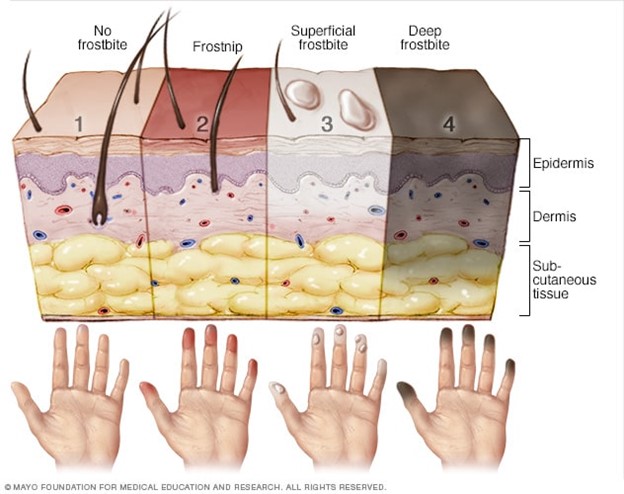Prolonged exposure to lower temperatures can lead to “frostbite”, otherwise known as freezing cold injury (FCI). FCI occurs during extreme cold which leads to vasoconstriction of blood vessels within the body, which can subsequently cause ischemia. Common parts of the body affected are the nose, ears, lips, hands, and feet. For the most severe injuries, amputation of the affected body part may occur, which may be devastating to the patient.
Treatment has classically depended on the degree of frostbite and has largely been supportive care through rewarming. In exciting news, the FDA has approved the use of Iloprost to treat frostbite, making it the first medication approved for these injuries in the US. Iloprost has been used in Europe and Canada with varying success. Aurlumyn, or iloprost, is a prostacyclin which is used to treat pulmonary arterial hypertension through vasodilation. Frostbite ischemia is a result of vasoconstriction, venous stasis, edema, microthrombi, and ice crystal formation. Iloprost works to counteract vasoconstriction, vasospasm and thrombosis. Side effects of the medication include headache, flushing, palpitations, fast heart rate, nausea, vomiting, dizziness, and hypotension.
The study followed 47 patients with severe frostbite, defined as having at least one digit (finger or toe) with frostbite stage 3 or 4 who were randomized to one of three treatment arms. Each treatment arm received aspirin. The different arms then received either Iloprost, buflomedil (a vasoactive medication), or iloprost and alteplase (tPA). tPA is a systemic thrombolytic agent with high side effect profile. The outcome after 7 days was determined by bone scans that predicted the need for amputations. The presence of the bone scan abnormality and eventual need for amputation was significantly lower in the two groups that received Iloprost. Interestingly, the addition of tPA did not have a significant positive or negative effect on the primary outcome of this particular study.
Certain populations are prone to frostbite, such as the elderly, children, homeless population. Activities involving prolonged cold exposure such as ice climbing, mountaineering, skiing/snowboarding also increase the risk of cold injury. Certain pre-existing conditions including peripheral vascular disease, Raynaud’s, diabetes, and smoking may also predispose or worsen the frostbite injury. The drug is anticipated to be made available for purchase by hospitals in the spring of 2024. Once made available, the makers do not anticipate barriers to access to the drug.

Frostbite Grading. Source: Mayo Clinic